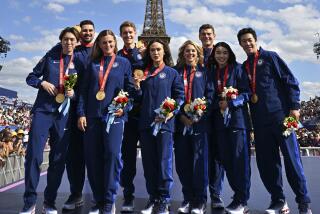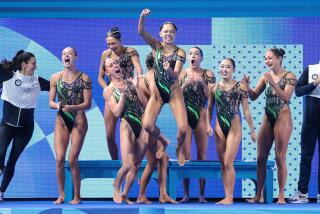U.S. Men Impress After Tough Start
- Share via
SYDNEY, Australia — The stumbles came early for the U.S. men’s gymnastics team but then they started to come less often.
Sean Townsend stepped off the mat on his very first tumbling pass on the floor exercise. Townsend, the leadoff man, the person in the position where steadiness counts, couldn’t stay inside the white lines.
Young Paul Hamm, a 17-year-old Olympic rookie, stumbled backward off the mat. Blaine Wilson, the top U.S. gymnast, an all-around medal hopeful, nearly flew right off the podium. Steve McCain looked like a pebble skipping across water as he bounced, bounced, bounced off the mat at the end of a flip.
Deductions, nothing but deductions for the U.S. on their first rotation at the Super Dome today.
This team has talked big about winning a team medal, which would be the first for the U.S. men since 1984 and then they got to the floor and stumbled around as if the lights were out and that thick, white line around the edges of the floor mat were invisible.
After that first rotation it looked as if the men might not even make it to Monday’s six-team final. Only Morgan Hamm, Paul’s twin, showed no hint of nerves, no twinge of fear on the floor. Morgan, second up for the U.S., scored a 9.612 and Coach Peter Kormann jumped up and high-fived the teenager.
All around them Russians were sticking landings and drawing gasps. On the high bar Alexei Nemov was performing four high-risk release moves. On the pommel horse McCain was letting go and dropping off.
But that was the only big mistake the U.S. made on the horse. John Roethlisberger, the 30-year-old three-time Olympian scored the best for the U.S. on both the horse (9.600) and the rings (9.612). The Hamms continued to be nerveless and finally, on the rings, Wilson avoided a major mistake.
After the morning session of team preliminaries, Belarus had been in first place.
Ivan Ivankov, who had been favored to win the gold all-around medal in 1996 and then suffered a ruptured Achilles’ tendon 12 days before the Games, also showed some nerves. Ivankov also started on the floor, stepped off the mat and scored an 8.925.
“I think I was too excited,” Ivankov said, “and maybe not concentrated enough. It was a long time wait, this Olympics, for me.”
Somehow the Hamms avoided the attacks of nerves.
On the vault, which was the fourth of six rotations for the U.S., and right after three members of the German team landed on their butts, first Morgan, then Paul, stuck landings and pumped fists.
Paul scored a 9.70, the highest U.S. mark of the afternoon. Morgan had scored a 9.350 and maybe the strong landings were contagious for Townsend nailed his landing and earned a 9.650.
Wilson did even better. Performing the same vault as Paul Hamm, a handspring double front, which has the highest start value, 10.00, Wilson flew through the air, twisted effortlessly, landed without a step.
For the first time in 90 minutes, the entire U.S. team leapt to its feet. After two-thirds of the competition, the U.S. had scored best on the vault, an event considered one of their weakest.
Through four rotations, the U.S. stood third in its rotation, behind the Ukraine and Russia. The U.S. also had a better score through four rotations than Belarus, which won the morning session and which had won a bronze medal at the 1999 world championships.
The Chinese, which won the 1999 worlds, and the Koreans, who were fifth, were in the later session.
More to Read
Go beyond the scoreboard
Get the latest on L.A.'s teams in the daily Sports Report newsletter.
You may occasionally receive promotional content from the Los Angeles Times.







